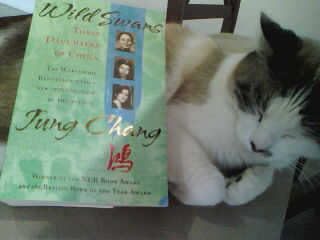book review: jung chang, wild swans

I received an obscure package during the summertime of last year. Its content, tightly swallowed in glorious bubble wrap, was Jung Chang’s family memoir, Wild Swans. The back blurb gave me an impression that it was an anti-communist manifesto. Politicking books are a chore to go through for me. But because it was sent by a close friend (whom we shall call Mr. Bear), I felt obliged to read it. So I did.
And I enjoyed it.
Jung Chang was born in the privileged circles of Mao’s Communist China. Her parents were both high ranking officials. As a result, she was afforded the best schools (in her defense, her academic achievements were irrefutable), higher food rations, better housing and a politically dominated childhood which eventually lead her to exile.
The book recounts the lives of her grandmother (a warlord’s concubine), her mother (a feisty and principled woman) and finally her own. Banned in China but bestseller everywhere else, Wild Swans tells both the story of three generations of Chinese women and the political unrest that persisted in twentieth century China.

Much of the enjoyment I derived from reading the book was due to its matter-of-fact prose. Saturated in Chinese culture and consummated with Chang’s sober writing style, it was refreshing and informative. It gives off the factual authority of a history book but with the intimacy of a journal.
I especially enjoyed reading the first half of the book. It was considerably more devoid of the politics and ‘revolutions’ that pervaded the memoir’s latter half. It was so full of culture, traditions and family life that it made me want to know more about China; that is, China before Mao tried to destroy its millennia of history.
Wild Swans is unarguably intended both as a book of memories and as Chang’s personal outlet against the Communist Regime that desiccated China’s vitality. The lack of the freedom of speech, the political extremism and deification of Mao, are some of the things that I found alienating in comparison to Australia’s current state. I can’t imagine being able to survive with that amount of suppression and fanaticism – but then again, if you were born into the fantasy (as Chang was), it doesn’t matter whether you are a good or a bad person: you will love your silence and worship the autocrat.
As much as I am cynical of the exactitude and truthfulness of autobiographies and memoirs, they are forms of literature that I admire. Every point of view will have a bias; every person is a member of a partisan society, so why not show the world your perspective? Besides, it must be daunting to entrust to the public one’s personal affairs (well, perhaps not to those people who feed off their sex tapes). Jung Chang’s Wild Swans, for one, is a very enjoyable read.
By Meryl Perez
Image Credits: 1, 2.


To think that seeing a quote I thought sadly insightful, and buying the book in which it was contained, led to this remarkable review. Now I want to read the book.